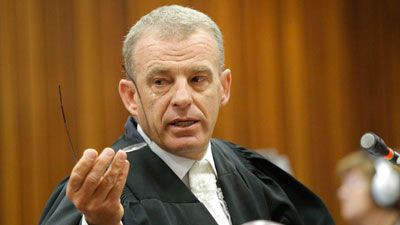Oscar Pistorius Trial: Witnesses Testifying In Case Endure Trauma, Anxiety

The witnesses in the Oscar Pistorius trial have played a key role in the case, helping Judge Thokozile Matilda Masipa piece together what exactly happened when Reeva Steenkamp was shot and killed on Valentine’s Day 2013. While the men and women who took the stand have been essential to the eventual verdict, some of the witnesses did not appreciate the way they were treated in court.
A few witnesses were subjected to particularly tough questions on the stand during cross examination in what has arguably been the most high-profile trial in South Africa in years. Neighbors of Pistorius, like Annette Stipp, as well as Michelle Burger and Charl Johnson, testified to hearing a woman scream when Steenkamp died. After telling the court what they recalled from the night of Steenkamp’s death, they were confronted by defense attorney Barry Roux.
"You feel you are being attacked personally,” Stipp told Karen Tewson, head of South Africa's National Prosecuting Authority, in a research paper cited South Africa's Times newspaper. “Your integrity is questioned. We felt that [we] were being attacked as [liars]."
Roux was relentless in court, as he looked to prove the Olympian’s claim that he didn’t intentionally shoot his girlfriend. Since the incident occurred over a year and a half ago, Pistorius has said that he thought he was firing his gun at an intruder who was standing behind his bathroom door.
At the beginning of the trial, matters grew tense between Roux and one of Pistorius’s neighbors, who was on the stand. Burger said that she heard a woman’s screams, followed by gunshots. Roux pressed her and insisted that it was Pistorius who she heard scream, followed by the sound of the double-amputee breaking down the bathroom door with a cricket bat. However, Burger refused to budge on her testimony.
While Burger hasn’t commented on her time in court, her husband, Charl Johnson, told the Guardian his stint on the witness stand was “not a pleasurable experience.” Stipp compared her experience to being “trampled by a bus.”
Witnesses for the defense also came under fire during the trial. Roger Dixon, who worked at a police forensics lab for 18 years, testified about the night in question. After giving his opinion about the order of gunshots from Pistorius, which differed from that of state pathologist Gert Saayman, he was attacked by prosecutor Gerrie Nel about his credentials.
“For the layman, it can be very traumatic to stand up there,” Dixon said, according to the Guardian. “You're not just getting questioned on your personal knowledge but on yourself. The system we have tries to break down your evidence and, if it can't do that, it tries to break you. After six days in the box, you could see how Oscar Pistorius himself was getting confused."
In Tewson's research paper, "embarrassed," "intimidating court environment" and "often hostile" described witnesses' experience on the stand.
Testifying under oath can cause anxiety in any trial, due to a fear of public speaking, and fear of inaccurately influencing the verdict. But in the Pistorius murder trial, there may be an even heavier burden on the witnesses due to the intense media coverage. In an international story, and with the growth of social media, private figures become increasingly more public and there is little they can do about it.
The Pistorius trial began in March in what has arguably been the most prominent murder trial of the year. A verdict is expected on Sept. 11.
© Copyright IBTimes 2024. All rights reserved.






















